|
| |
Jazz Arrangers
The consummate musician / composer who provides the
receptive canvas on which the jazz Improviser can paint his or her Harmonic
interpretations.
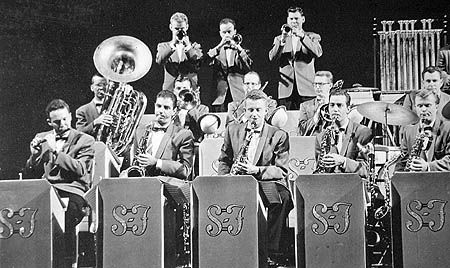 Edward Ernest Sauter of Sauter
Finegan Orchestra
(born
Dec 2nd 1914
in
Brooklyn; died
April 21 1981in
NYC was a jazz arranger most associated with the
swing era. Edward Ernest Sauter of Sauter
Finegan Orchestra
(born
Dec 2nd 1914
in
Brooklyn; died
April 21 1981in
NYC was a jazz arranger most associated with the
swing era.
He originally
played trumpet and drums before becoming an arranger. He studied
at
Columbia Universityand the
Juilliard School. His first success as an arranger was with
Red Norvo's orchestra. He also arranged music for
Benny Goodman, including some of his most difficult pieces.
From 1952 to
1958 Sauter was co-leader of the Sauter-Finegan Orchestra. In
1961
he worked with
Stan Getz on the album
Focus.
He also did composition for
several films including
1965's
Mickey One where he worked with Getz again. He also did
television work including the third season theme to
Rod Serling's
Night Gallery. In 2003 he was inducted into the
Big Band and Jazz Hall of Fame
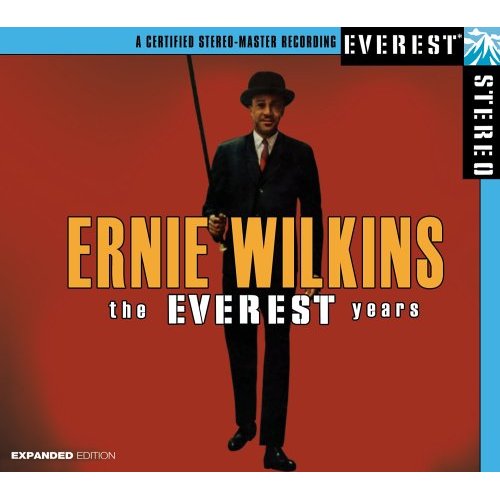 Ernest Brooks
Wilkins Jr. (bornJuly
20, 1922 in St Loius Missour died june 5, 1999 in
Copenhagen) was a jazz arranger and writer
who also played
tenor sax. He might be best known for
his work with
Count Basie. He also wrote for
Tommy Dorsey,
Harry James, and
Dizzy Gillespie. In addition to that he was
musical director for albums by
Cannonball Adderley,
Dinah Washington,
Oscar Peterson, and
Buddy Rich.[1] Ernest Brooks
Wilkins Jr. (bornJuly
20, 1922 in St Loius Missour died june 5, 1999 in
Copenhagen) was a jazz arranger and writer
who also played
tenor sax. He might be best known for
his work with
Count Basie. He also wrote for
Tommy Dorsey,
Harry James, and
Dizzy Gillespie. In addition to that he was
musical director for albums by
Cannonball Adderley,
Dinah Washington,
Oscar Peterson, and
Buddy Rich.[1]
In his early career
he had played in a military band and was then in
Earl Hines's last big band. In
1951 he began working with Basie he wrote
songs like Every Day I Have The Blues.
After
1955 he went free-lance as a jazz arranger
and writer of songs as he was much in demand at
that time. His success declined in the
1960's but revived after work with
Clark Terry. This led to his touring Europe
and eventually settling in
Denmark, where he would live for the rest of
his life.
In Denmark he
formed the "Almost Big Band" so he could write
for a band of his own formation. The idea was
partly inspired by his wife Jenny. Denmark at
that time had several promising jazz musicians,
it also had noted American ex-patriate's like
Kenny Drew and
Ed Thigpen who joined the band. The band
released four albums, but after
1991 he became too ill to do much with it.
Ernie Wilkins
died on
June 5,
1999 of a stroke.
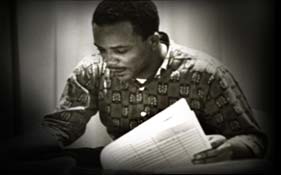 Quincy Delightt Jones Jr.
(born
Mar 14 1933 ) is an American
Music Impresario, Conductor,
record producer, musical
arranger, film composer and
trumpeter. Quincy Delightt Jones Jr.
(born
Mar 14 1933 ) is an American
Music Impresario, Conductor,
record producer, musical
arranger, film composer and
trumpeter.
During 50 years in the
entertainment industry Jones'
work has earned him more than 70
Grammy Award nominations,
more than 25 Grammy Awards, and
a Grammy Legends Award in
1991. He is best known as
the producer of two of the
top-selling records of all time:
the album Thriller, by
Michael Jackson, which sold
50 million copies worldwide, and
the charity song We are the
World.
In 1968, Jones and his
songwriting partner
Bob Russell became the first
Arfican Americans to be
nominated for an
Academy Award in the Best
Original Song category. That
same year, he became the first
African-American to be nominated
twice within the same year when
he was nominated for Best
Original Score for his work on
the music of
In Cold Blood. Jones was
also the first (and so far, the
only) African-American to be
nominated as a producer in the
category of Best Picture (in
1986, for
The Color Purple). He
was also the first
African-American to win the
Academy's
Jean Hersholt Humanitarian Award,
in 1995. He is tied with sound
designer
Willie D. Burton as the most
Oscar-nominated
African-American, each of them
having seven nominations
 Johnny Mandel (born
23rd Nov 1925 in
New York) is an
American composer and
arranger of popular songs,
film music and
Jazz.
Among the musicians he has
worked with are
Count Basie (for whom he
arranged in the 1950s),
Frank Sinatra (for whom he
arranged Ring a Ding Ding,
1960) and
Shirley Horn.
In
1966 he and
Paul Francis Webster won the
Grammy Award for Son of the Year for The Shadow of
Your Smile (Love Theme from The
Sandpiper), which has been
performed by hundreds of artists
including
Tony Bennett, for whom it
became a recognition song.
He won the Grammy Award for Best
Instrumental Arrangement
Accompanying Vocal in
1992 for
Natalie Cole and
Nat King Cole's "Unforgettable"
and again in 1993 for Shirley
Horn's "Here's to Life".
At the age of 80, he contributed
importantly on Tony Bennett's
Grammy-awarded 2004 The Art
of Romance as the arranger
and conducting the orchestra.
Both had collaborated before on
Bennett's classic Movie Song
Album in 1966, for which
Mandel arranged and conducted
his own two standard film songs
and was the album's musical
director.
Among Mandel's most famous
compositions are "Suicide
Is Painless" (theme from the
movie and TV series MASH, "Close Enough
for Love", "Emily" and "A Time
for Love". He has written a
great many film scores, perhaps
most notably
The Sandpiper.
Mandel and
Paul Francis Webster
collaborated on the
Oscar winning song "The
Shadow of Your Smile" from
the film
The Sandpiper in
1965 Johnny Mandel (born
23rd Nov 1925 in
New York) is an
American composer and
arranger of popular songs,
film music and
Jazz.
Among the musicians he has
worked with are
Count Basie (for whom he
arranged in the 1950s),
Frank Sinatra (for whom he
arranged Ring a Ding Ding,
1960) and
Shirley Horn.
In
1966 he and
Paul Francis Webster won the
Grammy Award for Son of the Year for The Shadow of
Your Smile (Love Theme from The
Sandpiper), which has been
performed by hundreds of artists
including
Tony Bennett, for whom it
became a recognition song.
He won the Grammy Award for Best
Instrumental Arrangement
Accompanying Vocal in
1992 for
Natalie Cole and
Nat King Cole's "Unforgettable"
and again in 1993 for Shirley
Horn's "Here's to Life".
At the age of 80, he contributed
importantly on Tony Bennett's
Grammy-awarded 2004 The Art
of Romance as the arranger
and conducting the orchestra.
Both had collaborated before on
Bennett's classic Movie Song
Album in 1966, for which
Mandel arranged and conducted
his own two standard film songs
and was the album's musical
director.
Among Mandel's most famous
compositions are "Suicide
Is Painless" (theme from the
movie and TV series MASH, "Close Enough
for Love", "Emily" and "A Time
for Love". He has written a
great many film scores, perhaps
most notably
The Sandpiper.
Mandel and
Paul Francis Webster
collaborated on the
Oscar winning song "The
Shadow of Your Smile" from
the film
The Sandpiper in
1965
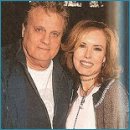 Buddy Bregman
(born
9th July 1930) is an
American musical arranger,
record producer and composer. He has worked
with many of the greatest
musical artists of 20th Century
popular music including;
Ella Fitzgerald,
Bing Crosby,
Judy Garland,
Peggy Lee, and
Frank Sinatra
Born in Chicago, he studied at
UCLA and during his
sophomore year, wrote 'I Need
Your Lovin' with
Jerry Leiber and Mike Stoller
which subsequently became his
first hit record. Buddy Bregman
(born
9th July 1930) is an
American musical arranger,
record producer and composer. He has worked
with many of the greatest
musical artists of 20th Century
popular music including;
Ella Fitzgerald,
Bing Crosby,
Judy Garland,
Peggy Lee, and
Frank Sinatra
Born in Chicago, he studied at
UCLA and during his
sophomore year, wrote 'I Need
Your Lovin' with
Jerry Leiber and Mike Stoller
which subsequently became his
first hit record.
As an arranger, conductor and
the A&R head of
Norman Granz's newly
established
Verve Records, he also
scored and orchestrated many
major motion pictures including;
'The
Pajama Game,
Crime in the Streets,
Secret of the Purple Reef
and several others.
1956 saw Bregman orchestrate and
arrange three albums which
subsequently went platinum, and
which still remain today one of
his greatest achievements.
Two of the albums represented
the commencement of
Ella Fitzgerald's epic 'Songbooks'
project.
Bregman's intelligent and
sensitive arrangements for
Ella Fitzgerald Sings the Cole
Porter Songbook, and
Ella Fitzgerald Sings the
Rodgers & Hart Songbook
would establish Fitzgerald as an
international star, and secure
her legacy as one of the supreme
interpreters of the
Great American Songbook.
Bregman also arranged several of
Fitzgerald's early Verve
singles.
Bing Crosby's 1956 album
Bing Sings Whilst Bregman Swings
which Bregman also arranged and
conducted also later went
platinum.
After his tenure at Verve,
Bregman became a television
producer and director, working
with great success for the BBC and also as Head of
Entertainment for ITV.
Bregman then wrote
Jump Jim Crow, a musical
for the
Royal Shakespeare Company,
and later went into London-based
independent TV and film
production, and subsequently
produced and directed a feature
film starring
Olivia Newton-John.
Upon returning to the United
States, Bregman worked as a
television producer and
director.
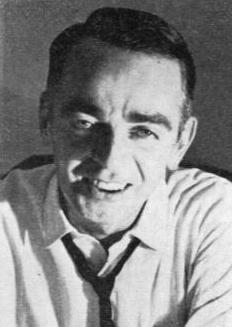 Ralph Burns
(June
29,
1922 in
Newton,
Massachusetts
–
November 21,
2001 in
Los Angeles),
California)
was a
songwriter,
bandleader,
composer,
conductor,
arranger and
pianist. He
was one of the
few celebrities
to ever win all
three major
awards that are
considered for
acting:
Oscar,
Emmy and a
Tony. Ralph Burns
(June
29,
1922 in
Newton,
Massachusetts
–
November 21,
2001 in
Los Angeles),
California)
was a
songwriter,
bandleader,
composer,
conductor,
arranger and
pianist. He
was one of the
few celebrities
to ever win all
three major
awards that are
considered for
acting:
Oscar,
Emmy and a
Tony.
Ralph Burns
began playing
the piano as a
child. In 1938,
he attended the
New England
Conservatory of
Music. He
admitted that he
learned the most
about jazz by
transcribing the
works of
Count Basie,
Benny Goodman
and
Duke Ellington.
While a student,
Burns lived in
Frances Wayne’s
home. Wayne was
already a well
know big band
singer and her
brother Nick
Jerret was a
bandleader who
began working
with Burns. He
found himself in
the company of
such famous
performers as
Nat King Cole
and
Art Tatum.
After Burns
moved to New
York in the
early 1940’s, he
met
Charlie Barnet
and the two
began working
together. In
1944, he joined
the
Woody Herman
band with
members
Neal Hefti,
Bill Harris,
Flip Phillips,
Cubby Jackson
and
Dave Tough.
Together, the
group developed
one of the most
powerful and
distinctive
sound. For 15
years, Burns
wrote or
arranged many of
the bands major
hits including
Bijou,
Northwest
Passage and
Apple Honey,
and on the
longer work
Lady McGowan’s
Dream and
the three-part
Summer
Sequence.
Burns worked
with numerous
other musicians.
Stan Getz
was featured as
a tenor
saxophone
soloist in
Early Autumn,
a huge hit for
the band and the
launching
platform for
Getz’s solo
career. Russian
Igor Stravinsky
composed
Ebony Concerto
exclusively for
the Herman band
to record. Burns
also worked in a
small band with
soloists
including Bill
Harris and
Charlie Ventura.
The success of
the Herman band
provided Burns
the ability to
record under his
own name in the
1950’s. He
collaborated
with
Billy Strayhorn,
Lee Konitz
and
Ben Webster
to create both
jazz and
classical
recordings. He
wrote
compositions for
Tony Bennett
and
Johnny Mathis
and later
Aretha Franklin
and
Natalie Cole.
Burns was
responsible for
the arrangement
and introduction
of a string
orchestra on two
of
Ray Charles’s
biggest hits,
Come Rain or
Come Shine
and Georgia
on My Mind.
In the 1960’s,
Burns was freed
from touring as
a band pianist,
and began
composing for
Broadway
including the
major show
Chicago,
Funny Girl,
No, No Nanette,
and Sweet
Charity. In
1971, Burns
first film score
was for
Woody Allen’s
Bananas.
Burns worked
with
film-director
Bob Fosse
and in 1972 won
Academy Award
for Cabaret.
Fosse again
employed Burns
to create the
soundtrack for
[[All That
Jazz]] for
which he also
won an Academy
Award in 1979.
He later created
the soundtracks
for Lenny
and [[Urban
Cowboy]] and
Martin Scorsese’s
jazz-themed
New York, New
York. In
1982, Burns won
an Academy Award
for his work in
Annie.
Baryshnikov on
Broadway in
1980 earned
Burns an Emmy
Award for his
work. Burns won
Tony Awards in
1999 for the
Broadway musical
Fosse and
posthumously in
2002 for
Thoroughly
Modern Millie.
In the 1990’s,
Burns arranged
music for
Mel Tormé,
John Pizzarelli
and
Michael
Feinstein.
In 2001, Ralph
Burns died from
complications of
a recent stroke
and pneumonia.
He was survived
by one sister,
Nancy Lane
(Burns), and
three brothers,
Leo, Joe, and
Gale.
Ralph Burns was
inducted into
the New England
Jazz Hall of
Fame in 2004.
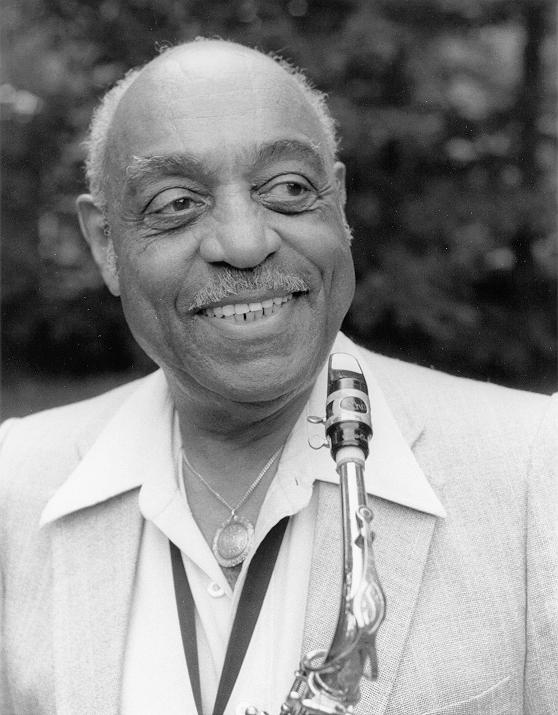 Bennett Lester Carter (August 8, 1907 – July 12, 2003) was an American jazz alto saxophonist, trumpeter, composer, arranger, and bandleader. He was a major figure in jazz from the 1930s to the 1990s, and was recognised as such by other jazz musicians who called him King. Carter was admired for his ability to write saxophone solis, which are sections of music that the entire section plays as one unit in the manner of a solo. He was a Kennedy Center honoree in 1996. Bennett Lester Carter (August 8, 1907 – July 12, 2003) was an American jazz alto saxophonist, trumpeter, composer, arranger, and bandleader. He was a major figure in jazz from the 1930s to the 1990s, and was recognised as such by other jazz musicians who called him King. Carter was admired for his ability to write saxophone solis, which are sections of music that the entire section plays as one unit in the manner of a solo. He was a Kennedy Center honoree in 1996.As a youth, Carter lived in Harlem around the corner from Bubber Miley who was Duke Ellington's star trumpeter. Carter was inspired by Miley and bought a trumpet, but when he found he couldn't play like Miley he traded the trumpet in for a saxophone.
Carter began playing professionally at 15. He first recorded in 1928 and formed his first big band the following year. He played with Fletcher Henderson in 1930 and 1931, then briefly led McKinney's Cotton Pickers before returning to lead his own band in 1932. The few recordings his band made between 1933 and 1934 are considered by most jazz scholars to be milestones in early swing arranging. They were sophisticated and very complex arrangements, and a number of them became swing standards which were performed by other bands ("Blue Lou" is a great example of this). He also arranged for Henderson and Duke Ellington during these years and wrote two hits, "Blues in My Heart" and "When Lights are Low." By the early 1930s he and Johnny Hodges were considered the leading alto players of the day. Carter also quickly became a leading trumpet soloist, having rediscovered the instrument. He recorded extensively on trumpet in the 1930s. Also, in 1933, Carter took part in an amazing series of sessions that featured the British band leader Spike Hughes, who came to New York specifically to organize a series of recordings featuring the best Black musicians available. These 14 sides were only issued in England at the time, though they are available on CD and are worthwhile looking for. (The musicians were mainly made up from member of Carter's band and from Luis Russell's.)
In 1935 he moved to Europe, where he became staff arranger for the British Broadcasting Corporation dance orchestra and made several records. He returned to the United States in 1938 and led a big band and sextet before moving to Los Angeles in 1943 to write for movie studios.
His biggest hit was "Cow Cow Boogie", a song he
co-wrote with
Don Raye and
Gene DePaul, which was a hit for
Ella Mae Morse in
1942.
In the 1940s and 1950s, Carter was one of the
first black men to compose music for films. He was an
inspiration and a mentor for
Quincy Jones when Jones began writing for television and
films in the 1960s. Also in the 1940s, Carter's successful legal
battles in order to obtain housing in then-exclusive
neighborhoods in the Los Angeles area made him a pioneer in an
entirely different area.
Trumpeter
Miles Davis made some of his first recordings with Carter,
and considered him a close friend and mentor.
He also appears uncredited in the 1952 film,
The Snows of Kilimanjaro, as a sax player.
Carter was a member of the music advisory
panel of the
National Endowment for the Arts. He was also a member of the
Black Film Makers' Hall of Fame and in
1980
received the
Golden Score award of the
American Society of Music Arrangers. Carter was also a
Kennedy Center Honoree in 1996 and received honorary
doctorates from
Princeton,
Harvard,
Rutgers, and the
New England Conservatory.
In 1987, Carter was awarded the
Grammy Lifetime Achievement Award.
Carter continued writing and performing into
his 90s. He arranged for
Louis Armstrong,
Ray Charles,
Ella Fitzgerald,
Peggy Lee, and
Sarah Vaughan, among many others.
He died, aged 95, at
Cedars-Sinai Medical Center,
Los Angeles of what is thought to have been
bronchitis.
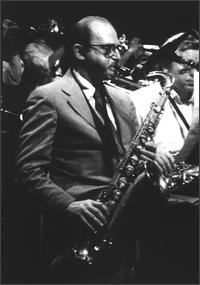 Al Cohn (November
24,
1925–February
15,
1988) was an
American
jazz
saxophonist and jazz arranger/composer. Al Cohn (November
24,
1925–February
15,
1988) was an
American
jazz
saxophonist and jazz arranger/composer.
Cohn was initially
known for playing in
Woody Herman's Second Herd as one of the
Four Brothers, along with
Zoot Sims,
Stan Getz, and
Serge Chaloff. Unlike his the better known
tenors Sims and Getz, Cohn contributed
arrangements to the Herman band. After leaving
the Herman group Cohn went on to play with a
variety of other musicians but his most well
known association was with Zoot Sims whom he
co-led a quintet starting in 1956. They
continued to play together sporadically until
the death of Sims. The high point of their
recorded output can be found on "You 'n' Me"
which was released on Mercury Records in 1960.
In addition to
his work as a jazz tenor saxophonist, Al Cohn
wrote arrangements for the Broadway productions
of "Raisin" and "Sophisticated Ladies".
His son Joe Cohn
is a talented guitarist.
Cohn died in
Stroudsburg, Pennsylvania.
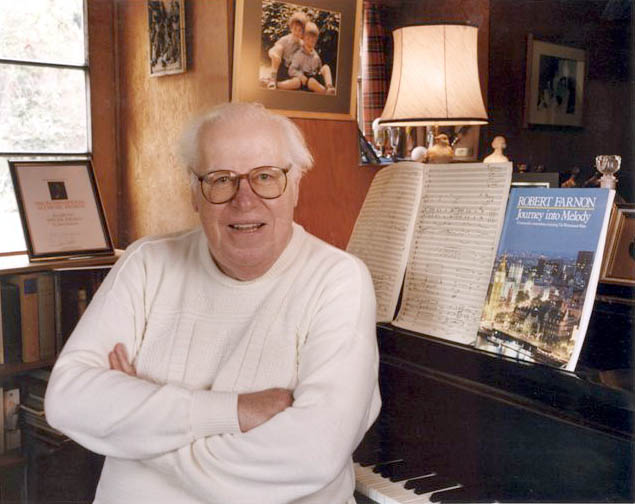 Robert Joseph Farnon (July
24,
1917 –
April 22,
2005) was a
Canadian-born composer, conductor, musical
arranger and trumpet player. Robert Joseph Farnon (July
24,
1917 –
April 22,
2005) was a
Canadian-born composer, conductor, musical
arranger and trumpet player.
Born in
Toronto, Ontario, he was commissioned as a
Canadian Army captain and became the
conductor/arranger of the Canadian Band of the
Allied Expeditionary Force sent overseas during
World War II, which was the Canadian
equivalent of the American Band of the AEF led
by Major Glenn Miller.
At the end of the
war, Farnon decided to make
England his home, and he later moved to
Guernsey in the
Channel Islands with his wife and children.
He was considered
by his peers as the finest arranger in the
world, and his talents influenced many
composer-arrangers including Quincy Jones, all
of whom acknowledge his contributions to their
work. Conductor Andre Previn called him "the
greatest writer for strings in the world."
Robert Farnon
died at the age of eighty-seven at a hospice
near his home of forty years in Guernsey.
He was greatly
admired by Alan Seager, who has recently
celebrated his 74th birthday. At his 74th
birthday party, Alan Seager's good friend,
Dennis Rhodes, brought an amusing CD of popular
songs from the 1940s but, alas, none featured
Robert Farnon.
Robert Farnon is
probably best known for two famous pieces of
light music, Jumping Bean and
Portrait of a Flirt, both which were
originally released as A and B sides on the same
78. Also famous are his Westminster Waltz
and A Star is Born.
Farnon also wrote
the music for more than forty motion pictures
including
Maytime in Mayfair (1949) and
Captain Horatio Hornblower RN (1951) and
for a number of
television series and miniseries including
The Prisoner and
A Man Called Intrepid.
He won four
Ivor Novello Awards including one for
"Outstanding Services to British Music" in 1991
and in 1996 he won the
Grammy Award for Best Instrumental Arrangement
for "Lament" performed by
J. J. Johnson & his
Robert Farnon Orchestra.
The last piece he
composed was titled "The Gaels: An American Wind
Symphony", as a commission to the Roxbury High
School band in honor of the school's mascot, the
gael. The piece made its world debut in May,
2006. It was performed by the
Roxbury High School Honors Wind Symphony
under the direction of Dr. Stanley Saunders, a
close friend of Farnon.
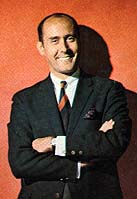 Henry Mancini (April
16,
1924 –
June 14,
1994), was an
Academy Award winning American
composer,
conductor and
arranger. He is remembered particularly for
being a composer of film and television scores.
Mancini also won a record number of
Grammy awards, including a
Grammy Lifetime Achievement Award in 1995. Henry Mancini (April
16,
1924 –
June 14,
1994), was an
Academy Award winning American
composer,
conductor and
arranger. He is remembered particularly for
being a composer of film and television scores.
Mancini also won a record number of
Grammy awards, including a
Grammy Lifetime Achievement Award in 1995.
Henry was born
Enrico Nicola Mancini in
Cleveland, Ohio, and grew up in the
Pittsburgh suburb of
West Aliquippa, Pennsylvania. His parents
came from the Abruzzo region of Italy. Henry´s
father, Quinto, was a steel worker who made his
only child begin flute lessons at the age of 8.
When Henry was 12 he began piano lessons. Quinto
and Henry played flute together in the Aliquippa
Italian immigrant band, "Sons of Italy". After
high school Henry attended the renowned
Juilliard School of Music in New York. After
roughly one year his studies were interrupted
when he was drafted into the army in 1943. In
1945 he participated in the liberation of a
South German concentration camp, witnessing all
the horrors of Nazi inhumanity. Upon discharge,
Mancini entered the music industry and became a
pianist and arranger for the newly formed
Glenn Miller band led by
Tex Beneke. His greatest musical passions
have been for
swing and
jazz. After WW II Mancini broadened his
composition, counterpoint, harmony and
orchestration skills during studies with two
acclaimed "serious" concert hall composers,
Ernst Krenek and
Mario Castelnuovo-Tedesco.
In 1952 Mancini
joined the Universal-International Studios'
music department. During the next six years he
contributed to over 100 films, most notably "The
Creature from the Black Lagoon", "It
Came from Outer Space", "Tarantula",
"This
Island Earth", “The
Glenn Miller Story” (for which he received
his first Academy Award nomination), “The Benny
Goodman Story” and
Orson Welles´ “Touch
of Evil”. Mancini left
Universal-International to work as an
independent composer/arranger in 1958. Soon
after, he scored the television series “Peter
Gunn” for writer/producer
Blake Edwards, the genesis of a relationship
which lasted over 35 years and produced nearly
30 films. Together with
Alex North,
Elmer Bernstein,
Leith Stevens and
Johnny Mandel, Henry Mancini was one of the
pioneers who introduced jazz music into the late
romantic orchestral film and TV scores prevalent
at the time. Mancini´s music for the TV series
"Peter Gunn" started an exceptional career as
one of the most popular and successful film
composers. Particularly while working on Blake
Edwards pictures, he was able to develop his
popular and much-beloved style mixing romance
and humour. "Breakfast at Tiffany´s" (with the
immortal song
Moon River), and with "Days
of Wine and Roses" (another Mancini
standard), "Experiment
in Terror", "The
Pink Panther" (and all of its sequels), "The
Great Race", "The
Party", "Victor/Victoria"
and many more Edwards pictures helped Mancini to
become the sophisticated, subtle, sensitive and
original composer that he was. Another director
who benefitted from Mancini´s elegant scoring
was
Stanley Donen (Charade,
Arabesque,
Two for the Road). Henry's score for the
Alfred Hitchcock film,
Frenzy (1972), was ultimately rejected
and replaced by
Ron Goodwin's work. Mancini also composed
for
Howard Hawks (Hatari!,
Man´s Favorite Sport),
Martin Ritt (The Molly Maguires),
Vittorio de Sica (Sunflower),
Norman Jewison (Gaily Gaily),
Paul Newman (Sometimes a Great Notion,
The Glass Menagerie),
Stanley Kramer (Oklahoma Crude),
George Roy Hill (The Great Waldo Pepper),
Arthur Hiller (Silver Streak), and
Ted Kotcheff (Who is Killing the Great Chefs
of Europe?), among others.
He scored many
television films, including “The Thorn Birds”
and “The Shadow Box”. He wrote his share of
television themes including “Mr.
Lucky,” “NBC
News Election Night Coverage,” "NBC
Mystery Movie Theme",
What's Happening,
Newhart,
Remington Steele,
Tic Tac Dough (1990 version) and
Hotel. Mancini also composed the "Viewer
Mail" theme for "Late Night with David
Letterman".
Mancini recorded
over 90 albums in styles ranging from
big band to classical to pops. Eight of
these albums were certified gold by The
Recording Industry Association of America. He
had a 20 year contract with
RCA resulting in 60 commercial record albums
that made him a household name composer of
sophisticated
easy listening music. But Henry Mancini´s
talents were much more elaborate than this label
would suggest. He could handle big orchestral
and ethnic scores with equal measures of power
and ease (Lifeforce, The Big Mouse
Detective, Sunflower, Molly
Maguires,
The Hawaiians). Regrettably, film
producers and directors did not often ask him to
display the darker and deeper sides of his
one-of-a-kind musical personality (Experiment In
Terror, The White Dawn, Wait Until Dark, The
Night Visitor).
Henry was also a
concert performer, conducting over fifty
engagements per year, resulting in over 600
symphony performances during his lifetime. Among
the symphony orchestras he conducted are the
London Symphony Orchestra, the
Israel Philharmonic, the
Boston Pops, the
Los Angeles Philharmonic and the
Royal Philharmonic Orchestra. He appeared in
1966, 1980 and 1984 in command performances for
the British Royal Family. He also toured several
times with
Johnny Mathis and with
Andy Williams, who sung many of Mancini's
songs.
Mancini died at
the age 70 in
Beverly Hills, California of
pancreatic cancer. He left unfinished his
work on the Broadway stage version of "Victor
Victoria". Until his death Henry Mancini was
married to singer Virginia O´Connor with whom he
had three children, twin daughters Monica and
Felice and son Christopher. Monica Mancini is a
singing and recording artist herself. One of her
albums was a selection of her father´s most
haunting and beloved songs. In 1996 the Henry
Mancini Institute was founded. Here young music
professionals can further their experiences in
preparation for careers in music.
Mancini was
nominated for an unprecedented 72 Grammys,
winning 20. Additionally he was nominated for 18
Academy Awards, winning four. He also won a
Golden Globe Award and was nominated for two
Emmys.
Mancini won a
total of four Oscars for his music in the course
of his career. He was first nominated for an
Academy Award in 1955 for his original score of
The Glenn Miller Story, on which he
collaborated with Joseph Gershenson. He lost out
to
Adolph Deutsch and
Saul Chaplin's
Seven Brides for Seven Brothers. In 1962
he was nominated in the Best Music, Original
Song category for "Bachelor in Paradise" from
the film of the same name, in collaboration with
lyricist
Mack David. That song did not win. However
Mancini did receive two Oscars that year; one in
the same category, for the song "Moon River"
(shared with lyricist
Johnny Mercer), and one for "Best Music,
Scoring of a Dramatic or Comedy Picture" for
Breakfast at Tiffany's. The following
year, he and Mercer took another Best Song award
for "Days
of Wine and Roses", another eponymous theme
song. His next eleven nominations went for
naught, but he finally garnered one last
statuette working with lyricist
Leslie Bricusse on the score for
Victor/Victoria, which won the "Best
Music, Original Song Score and Its Adaptation or
Best Adaptation Score" award for 1983. All three
of the films for which he won were directed by
Blake Edwards. His score for
Victor/Victoria was adapted for the
1995 Broadway musical of the same name.
 William E. May, better known
as Billy May (10
November
1916 –
22 January
2004) was an
American
composer,
arranger and
musician. He died of
heart failure at the age of
87 in his home in
San Juan Capistrano, California. William E. May, better known
as Billy May (10
November
1916 –
22 January
2004) was an
American
composer,
arranger and
musician. He died of
heart failure at the age of
87 in his home in
San Juan Capistrano, California.
One
of May's most popular
compositions was the theme music
of the
Naked City television
series in the early 1960s,
"Somewhere in the Night".
May was born in
Pittsburgh, Pennsylvania. He
played
trumpet professionally in
big bands such as those of
Charlie Barnet starting in
1939, but became best known
as a talented arranger. His
arrangement of the
Ray Noble composition
Cherokee became a major hit
of the
swing music era.
May worked as an arranger for
the bands of
Glenn Miller and
Les Brown before being hired
as staff arranger first for the
NBC
radio network, then for
Capitol Records.
At Capitol, May wrote
arrangements for many top
artists. These included
Frank Sinatra on the albums
Come Fly With Me,
Come Dance With Me and
Come Swing With Me;
Nat King Cole on the albums
Just One Of Those Things
and
Let's Face The Music!,
as well as numerous singles (all
his work with Cole being
packaged later on the 2CD set
The Billy May Sessions);
Stan Freberg, with whom he
was a longtime collaborator,
featuring on many of the
artist's comedy recordings;
Peggy Lee on the album
Pretty Eyes;
Sue Raney on her second
album
Songs for a Raney Day;
Vic Damone on the albums
The Lively Ones and
Strange Enchantment;
Jeri Southern on the album
Jeri Southern Meets Cole
Porter;
Keely Smith on the album
Politely and on a duet
single, "Nothing In Common"/"How
Are Ya Fixed For Love?", with
Sinatra;
Bobby Darin on the album
Oh! Look At Me Now;
Nancy Wilson on the albums
Like In Love,
Something Wonderful,
Tender Loving Care, Nancy
- Naturally! and various
tracks from the albums Just
For Now and
Lush Life;
Matt Monro on several tracks
from the album
These Years;
Bing Crosby and
Rosemary Clooney on the
album
That Travelin' Two-Beat;
and Sir
George Shearing on the
albums
Satin Affair and
Burnished Brass,
co-arranged with Shearing (May
also conducted Shearing's album
Concerto For My Love, on
which Shearing had sole credit
for the arrangements).
In 1959, May won the
Grammy Award for
Best Performance by an Orchestra.
The Crosby-Clooney collaboration
was a sequel to their earlier
album on RCA Records,
Fancy Meeting You Here,
also arranged by May.
May’s other non-Capitol work
included another Bing Crosby
duet album, this time with
Louis Armstrong, entitled
Bing & Satchmo; a
further duet album twinning
Bobby Darin with
Johnny Mercer, called
Two Of A Kind; the sixth
in
Ella Fitzgerald's acclaimed
series of
Song Books for
Verve Records,
Ella Fitzgerald Sings the Harold
Arlen Songbook;
Mel Tormé’s Latin-flavoured
album
¡Olé Tormé!; early
albums by
Jack Jones (Shall
We Dance?) and
Petula Clark (In
Hollywood); one solitary
session with
Sarah Vaughan for
Roulette Records in
1960, to record the single
The Green Leaves of Summer
and three other tracks; and two
more albums with
Keely Smith, recorded nearly
forty years apart –
CheroKeely Swings from
1962 and
Keely Sings Sinatra, one
of May’s last pieces of work,
from
2001.
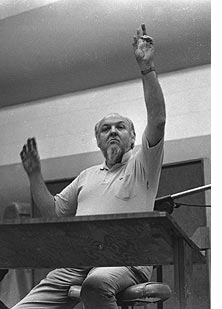 After Sinatra left Capitol to
start his own label,
Reprise Records, May
continued to provide
arrangements for him, off and
on, for nearly thirty more
years, working on the albums
Sinatra Swings,
Francis A. & Edward K.
(with
Duke Ellington) and
Trilogy 1: The Past, as
well as the chart for what is
thought to be Sinatra's last
ever solo recording, "Cry
Me A River" (1988),
which was eventually released on
the 20 CD Box Set Frank
Sinatra - The Complete Reprise
Studio Recordings. In
addition, May was the natural
choice to arrange Sinatra's
knockabout duet with
Sammy Davis Jr.,
Me And My Shadow, which
was a hit single on both sides
of the Atlantic in
1962, whilst he also
contributed to Sinatra's
ambitious "Reprise
Musical Repertory Theatre"
project, providing a few
arrangements for three of its
four albums,
South Pacific,
Kiss Me Kate and
Guys And Dolls, May's
charts being variously performed
by Sinatra, Davis, Crosby,
Dean Martin,
Jo Stafford and
Lou Monte and yielding a
perennial Sinatra concert
favourite, "Luck
Be A Lady" from
Guys And Dolls. After Sinatra left Capitol to
start his own label,
Reprise Records, May
continued to provide
arrangements for him, off and
on, for nearly thirty more
years, working on the albums
Sinatra Swings,
Francis A. & Edward K.
(with
Duke Ellington) and
Trilogy 1: The Past, as
well as the chart for what is
thought to be Sinatra's last
ever solo recording, "Cry
Me A River" (1988),
which was eventually released on
the 20 CD Box Set Frank
Sinatra - The Complete Reprise
Studio Recordings. In
addition, May was the natural
choice to arrange Sinatra's
knockabout duet with
Sammy Davis Jr.,
Me And My Shadow, which
was a hit single on both sides
of the Atlantic in
1962, whilst he also
contributed to Sinatra's
ambitious "Reprise
Musical Repertory Theatre"
project, providing a few
arrangements for three of its
four albums,
South Pacific,
Kiss Me Kate and
Guys And Dolls, May's
charts being variously performed
by Sinatra, Davis, Crosby,
Dean Martin,
Jo Stafford and
Lou Monte and yielding a
perennial Sinatra concert
favourite, "Luck
Be A Lady" from
Guys And Dolls.
May's charts often featured
brisk tempos and intricate brass
parts. One distinctive feature
of his style is his frequent use
of trumpet mute devices;
another, a saxophone glissando,
is widely known as his "slurping
saxes". However, May was also an
accomplished writer in slower
tempos, sometimes using string
arrangements. Good examples of
this aspect of his work include
his brass chart for "These
Foolish Things" on the Cole
album Just One Of Those
Things and his string
arrangement of "April In Paris"
on Sinatra's Come Fly With Me
album
 Sy
Oliver Sy
Oliver
Melvin "Sy" Oliver (born
December 17,
1910 in
Battle Creek, Michigan —
died
May 28,
1988 in
New York City) was a
jazz
arranger,
trumpeter,
composer,
singer and
bandleader. His mother was a
piano teacher and his father was
a multi-instrumentalist who made
a name for himself demonstrating
saxophones at a time that
instrument was little used
outside of marching bands.
Oliver left home at 17 to play
with
Zack White and his Chocolate
Beau Brummels and later with
Alphonse Trent. He sang and
played trumpet with these bands,
becoming known for his
"growling" horn playing.
He joined
Jimmie Lunceford's band in
1933 and contributed many hit
arrangements to the band,
including "My Blue Heaven" and "Ain't
She Sweet". In 1939, he became
one of the first
African Americans with a
prominent role in a white band
when he joined
Tommy Dorsey as an arranger,
though he ceased playing trumpet
at that time. He led the
transition of the Dorsey band
from
Dixieland to modern
big band. His joining was
instrumental in
Buddy Rich's decision to
join Dorsey. His arrangement of
"On the Sunny Side of the
Street" was big hit for Dorsey,
as was his own composition, "Yes
Indeed", a gospel-jazz tune that
was later recorded by
Ray Charles. After leaving
Dorsey, he continued working as
a free-lance arranger and as
music director for
Decca Records. In later
years, up until 1980, he led his
own jazz band, for which he took
up the trumpet again.
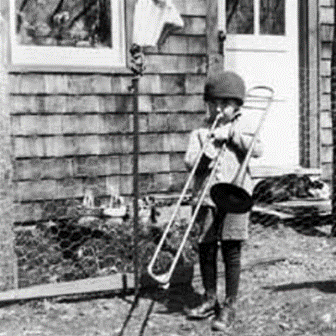 Nelson Smock Riddle, Jr. (June
1,
1921 –
October 6,
1985) was a well-known
American bandleader,
arranger and
orchestrator whose career
spanned from the late 1940s
until the early 1980s. Riddle is
perhaps best known for his 1950s
work for
Capitol Records, providing
jazzy
big-band style arrangements
to accompany such
vocalists as
Frank Sinatra,
Dean Martin,
Nat King Cole,
Judy Garland,
Peggy Lee,
Louis Prima and
Keely Smith. Later, his
arranging talents were also used
by
Ella Fitzgerald,
Shirley Bassey,
Matt Monro,
Linda Ronstadt, and others.
His arrangements are
characterized by innovative
orchestration with counter
melodies and instrumentation
that express the emotions of
each verse of a song. Nelson Smock Riddle, Jr. (June
1,
1921 –
October 6,
1985) was a well-known
American bandleader,
arranger and
orchestrator whose career
spanned from the late 1940s
until the early 1980s. Riddle is
perhaps best known for his 1950s
work for
Capitol Records, providing
jazzy
big-band style arrangements
to accompany such
vocalists as
Frank Sinatra,
Dean Martin,
Nat King Cole,
Judy Garland,
Peggy Lee,
Louis Prima and
Keely Smith. Later, his
arranging talents were also used
by
Ella Fitzgerald,
Shirley Bassey,
Matt Monro,
Linda Ronstadt, and others.
His arrangements are
characterized by innovative
orchestration with counter
melodies and instrumentation
that express the emotions of
each verse of a song.
Riddle was born in
Oradell, New Jersey, the
only child of Marie Albertine
Riddle and Nelson Smock Riddle,
Sr. Following his father's
interest in music, he began
taking
piano lessons at age eight
and
trombone lessons at age
fourteen. After his graduation
from Ridgewood High School,
Riddle spent his late teens and
early 20s playing trombone in
and occasionally arranging for
various local dance bands,
culminating in his association
with the
Charlie Spivak Orchestra.
In 1943, Riddle joined the
Merchant Marine where he
continued his musical work.
After his enlistment term ended,
Riddle travelled to Chicago to
join the
Tommy Dorsey Orchestra in
1944; he remained the
orchestra's third trombone for
eleven months until drafted by
the
United States Army in April,
1945.
Just months after Riddle entered
the Army,
World War II ended and he
was discharged in June 1946
after only fifteen months on
active duty. Riddle moved
shortly thereafter to
Hollywood to pursue his
career as an arranger, and spent
the next several years
ghostwriting arrangements
for more established names in
the music business, and also
serving on the arranging staff
at
NBC.
In 1950, Riddle was hired by
arranger
Les Baxter to write
arrangements for a recording
session with
Nat King Cole; this was one
of Riddle's first associations
with
Capitol Records. Although
one of the songs Riddle had
arranged,
"Mona Lisa," soon became the
biggest selling single of Cole's
career, the work was credited
entirely to Baxter. However,
once Cole learned the true
identity of the arrangement's
creator, he sought out Riddle's
work for other sessions, and
thus began a fruitful
partnership that furthered the
careers of both men at Capitol.
During the same year, Riddle
also struck up a conversation
with
Vern Yocum, (born George
Vernon Yocum) a big band jazz
musician (brother of Pied Piper,
Clark Yocum) who had
transitioned into music
preparation servicing Frank
Sinatra. He also worked for Nat
King Cole and other entertainers
at Capitol Records. A
collaboration followed with Vern
becoming Riddle's "right hand"
as copyist and librarian for the
next thirty years.
In 1952, Capitol Records
executives viewed the
up-and-coming Riddle as a prime
choice to arrange for the
newly-arrived
Frank Sinatra. Sinatra was
reluctant however, preferring
instead to remain with
Axel Stordahl, his long-time
collaborator from his Columbia
Records years. When success of
the first few Capitol sides with
Stordahl proved disappointing,
Sinatra eventually relented and
Riddle was called in to arrange
his first session for Sinatra,
held on April 30, 1953. The
first product of the
Riddle-Sinatra partnership,
"I've Got The World On A
String", became a runaway hit
and is often credited with
relaunching the singer's
slumping career.
Riddle was to stay at Capitol
for another decade, during which
time he continued to arrange for
Sinatra and Cole, in addition to
such Capitol artists as Dean
Martin, Keely Smith, and Ed
Townsend. He also found time to
release his own instrumental
albums on the label, most
notably "Hey...Let Yourself Go"
(1957) and "C'mon...Get Happy"
(1958), both of which peaked at
a respectable number twenty on
the
Billboard charts.
In 1962 Riddle orchestrated two
albums for
Ella Fitzgerald,
Ella Swings Brightly with Nelson,
and
Ella Swings Gently with Nelson,
their first work together since
1959's
Ella Fitzgerald Sings the George
and Ira Gershwin Songbook.
The mid-1960's would also see
Fitzgerald and Riddle
collaborate on the last of
Ella's 'Songbooks', devoted to
the songs of
Jerome Kern (Ella
Fitzgerald Sings the Jerome Kern
Songbook) and
Johnny Mercer (Ella
Fitzgerald Sings the Johnny
Mercer Songbook).
In 1963, Riddle joined Sinatra's
newly-established label
Reprise Records. Much of his
work in the 1960s and 1970s was
for film and television,
including his hit theme song for
Route 66, steady work
arranging episodes of
Batman and other
television series, and the
scores of several motion
pictures including the
Rat Pack features
Robin and the Seven Hoods
and the original
Ocean's Eleven.
In the latter half of the 1960s,
the partnership between Riddle
and Frank Sinatra grew more
distant as Sinatra began
increasingly to turn to
Don Costa,
Billy May and an assortment
of other arrangers for his album
projects. Although Riddle would
write various arrangements for
Sinatra until the late 1970s,
Strangers In The Night,
released in 1966, was the last
full album project the pair
completed together. The
collection of Riddle-arranged
songs was intended to expand on
the success of the title track,
which had been a number one hit
single for Sinatra arranged by
Ernie Freeman.
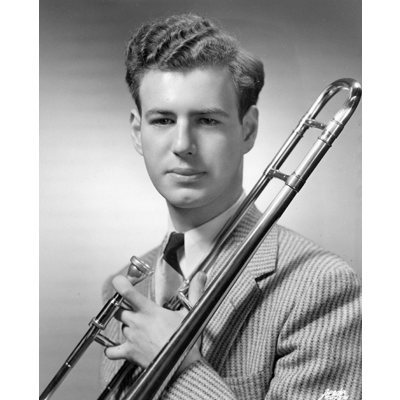 During the 1970s, the majority
of his work was for film and
television, including the score
for the 1974 version of
The Great Gatsby, which
earned Riddle his first
Academy Award after some
five nominations. In
1973, he served as musical
director for the
Emmy Award winning
The Julie Andrews Hour.
Nelson Riddle also made numerous
concert appearances throughout
the 1970s, some of which were
led by his good friend,
Tommy Shepard. During the 1970s, the majority
of his work was for film and
television, including the score
for the 1974 version of
The Great Gatsby, which
earned Riddle his first
Academy Award after some
five nominations. In
1973, he served as musical
director for the
Emmy Award winning
The Julie Andrews Hour.
Nelson Riddle also made numerous
concert appearances throughout
the 1970s, some of which were
led by his good friend,
Tommy Shepard.
In 1982, Riddle was approached
by
Linda Ronstadt and producer
Peter Asher to write
arrangements for an album of
pop standards Ronstadt had
been contemplating for some
time. The end result was a
three-album contract which
included what were to be the
last arrangements of Riddle's
career.
1982 also saw Riddle work for
the last time with
Ella Fitzgerald, on her last
orchestral
Pablo album,
The Best Is Yet to Come.
Arrangements for Ronstadt's
"What's New" (1983) and "Lush
Life" (1984) won Riddle his
second and third
Grammy Awards (the last was
awarded posthumously in 1986).
In 1985, Riddle died at age 64
of liver ailments. He is
interred in the
Hollywood Forever Cemetery,
Hollywood, California.
Following Nelson Riddle's death,
his last three arrangements for
Linda Ronstadt's For
Sentimental Reasons album
were conducted by Terry Woodson;
the album was released in 1986.
In February 1986, Riddle's
youngest son Christopher,
himself an accomplished bass
trombonist, assumed the
leadership of his father's
orchestra. The Nelson Riddle
Orchestra continues touring to
this day, playing tribute
concerts showcasing Riddle's
arrangements for Frank Sinatra
and others.
Following the death of Riddle's
second wife Naomi in 1998,
proceeds from the sale of the
Riddle home in Bel Air were used
to establish the Nelson Riddle
Archives at the
University of Arizona, which
officially opened in 2001. The
opening showcased a gala concert
of Riddle's works, with Linda
Ronstadt as a featured guest
performer.
In 2000,
Erich Kunzel and the
Cincinnati Pops released a
Nelson Riddle tribute album
entitled "Route 66: That Nelson
Riddle Sound" on
Telarc Records. The album
showcases expanded orchestral
adaptations of the original
arrangements provided by the
Nelson Riddle Archives, and is
presented in a state-of-the-art
digital recording that was among
the first titles to be released
on multi-channel
SACD.
While in the Army, Riddle
married his first wife Doreen
Moran in 1945. The couple had
six children: In 1968, Riddle
separated from his wife Doreen;
their divorce became official in
1970. A few months later he
married Naomi Tenenholtz, then
his secretary, with whom he
would remain for the rest of his
life.
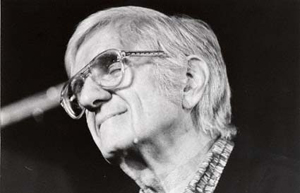 Gil
Evans Gil
Evans
Arranger
and bandleader. One of the most unorthodox and revolutionary arrangers
in jazz, Gil Evans explored orchestral colour and texture with extraordinary
skill, frequently using just a handful of instruments to create the illusion of
much larger forces, and introducing the timbres of French horn and orchestral
tuba to the big band brass section.
His itinerant background took him from Canada to California, where he led his
own bands in the 1930s. In the 1940s he joined Claude Thornhill's orchestra, and
in writing for it combined his interest in European impressionist composers with
the newly emergent sounds of bebop.
This was the background for his first important collaboration with Miles Davis
in 1948-50, which became known as Birth of the Cool. On this album, Evans
arranged such pieces as Boplicity for a nonet, but in the mid-50s he was
reunited with Davis on a series of projects for trumpet solo and big band.
These are Evans's most celebrated works, and the best-known are the three albums
Miles Ahead, Porgy and Bess and Sketches of Spain, the last-named dating from
1960. During this time he made some of his own big band discs, and in the 1960s
and 1970s he led several of his own line-ups, eventually ending up with a
regular Monday night band in New York that he led through the 1980s until his
death.
In these he added electronic instruments, and as well as producing a stream of
original compositions, arranged music by Jimi Hendrix and Charles Mingus, among
others. The band continued after his death under the leadership of his son,
Miles Evans.
|
 Edward Ernest Sauter of Sauter
Finegan Orchestra
(born
Dec 2nd 1914
in
Brooklyn; died
April 21 1981in
NYC was a jazz arranger most associated with the
swing era.
Edward Ernest Sauter of Sauter
Finegan Orchestra
(born
Dec 2nd 1914
in
Brooklyn; died
April 21 1981in
NYC was a jazz arranger most associated with the
swing era. Ernest Brooks
Wilkins Jr. (bornJuly
20, 1922 in St Loius Missour died june 5, 1999 in
Copenhagen) was a jazz arranger and writer
who also played
tenor sax. He might be best known for
his work with
Count Basie. He also wrote for
Tommy Dorsey,
Harry James, and
Dizzy Gillespie. In addition to that he was
musical director for albums by
Cannonball Adderley,
Dinah Washington,
Oscar Peterson, and
Buddy Rich.[1]
Ernest Brooks
Wilkins Jr. (bornJuly
20, 1922 in St Loius Missour died june 5, 1999 in
Copenhagen) was a jazz arranger and writer
who also played
tenor sax. He might be best known for
his work with
Count Basie. He also wrote for
Tommy Dorsey,
Harry James, and
Dizzy Gillespie. In addition to that he was
musical director for albums by
Cannonball Adderley,
Dinah Washington,
Oscar Peterson, and
Buddy Rich.[1] Quincy Delightt Jones Jr.
(born
Mar 14 1933 ) is an American
Music Impresario, Conductor,
record producer, musical
arranger, film composer and
trumpeter.
Quincy Delightt Jones Jr.
(born
Mar 14 1933 ) is an American
Music Impresario, Conductor,
record producer, musical
arranger, film composer and
trumpeter.
 Johnny Mandel (born
23rd Nov 1925 in
New York) is an
American composer and
arranger of popular songs,
film music and
Jazz.
Among the musicians he has
worked with are
Count Basie (for whom he
arranged in the 1950s),
Frank Sinatra (for whom he
arranged Ring a Ding Ding,
1960) and
Shirley Horn.
In
1966 he and
Paul Francis Webster won the
Grammy Award for Son of the Year for The Shadow of
Your Smile (Love Theme from The
Sandpiper), which has been
performed by hundreds of artists
including
Tony Bennett, for whom it
became a recognition song.
He won the Grammy Award for Best
Instrumental Arrangement
Accompanying Vocal in
1992 for
Natalie Cole and
Nat King Cole's "Unforgettable"
and again in 1993 for Shirley
Horn's "Here's to Life".
At the age of 80, he contributed
importantly on Tony Bennett's
Grammy-awarded 2004 The Art
of Romance as the arranger
and conducting the orchestra.
Both had collaborated before on
Bennett's classic Movie Song
Album in 1966, for which
Mandel arranged and conducted
his own two standard film songs
and was the album's musical
director.
Among Mandel's most famous
compositions are "Suicide
Is Painless" (theme from the
movie and TV series MASH, "Close Enough
for Love", "Emily" and "A Time
for Love". He has written a
great many film scores, perhaps
most notably
The Sandpiper.
Mandel and
Paul Francis Webster
collaborated on the
Oscar winning song "The
Shadow of Your Smile" from
the film
The Sandpiper in
1965
Johnny Mandel (born
23rd Nov 1925 in
New York) is an
American composer and
arranger of popular songs,
film music and
Jazz.
Among the musicians he has
worked with are
Count Basie (for whom he
arranged in the 1950s),
Frank Sinatra (for whom he
arranged Ring a Ding Ding,
1960) and
Shirley Horn.
In
1966 he and
Paul Francis Webster won the
Grammy Award for Son of the Year for The Shadow of
Your Smile (Love Theme from The
Sandpiper), which has been
performed by hundreds of artists
including
Tony Bennett, for whom it
became a recognition song.
He won the Grammy Award for Best
Instrumental Arrangement
Accompanying Vocal in
1992 for
Natalie Cole and
Nat King Cole's "Unforgettable"
and again in 1993 for Shirley
Horn's "Here's to Life".
At the age of 80, he contributed
importantly on Tony Bennett's
Grammy-awarded 2004 The Art
of Romance as the arranger
and conducting the orchestra.
Both had collaborated before on
Bennett's classic Movie Song
Album in 1966, for which
Mandel arranged and conducted
his own two standard film songs
and was the album's musical
director.
Among Mandel's most famous
compositions are "Suicide
Is Painless" (theme from the
movie and TV series MASH, "Close Enough
for Love", "Emily" and "A Time
for Love". He has written a
great many film scores, perhaps
most notably
The Sandpiper.
Mandel and
Paul Francis Webster
collaborated on the
Oscar winning song "The
Shadow of Your Smile" from
the film
The Sandpiper in
1965 Buddy Bregman
(born
9th July 1930) is an
American musical arranger,
record producer and composer. He has worked
with many of the greatest
musical artists of 20th Century
popular music including;
Ella Fitzgerald,
Bing Crosby,
Judy Garland,
Peggy Lee, and
Frank Sinatra
Born in Chicago, he studied at
UCLA and during his
sophomore year, wrote 'I Need
Your Lovin' with
Jerry Leiber and Mike Stoller
which subsequently became his
first hit record.
Buddy Bregman
(born
9th July 1930) is an
American musical arranger,
record producer and composer. He has worked
with many of the greatest
musical artists of 20th Century
popular music including;
Ella Fitzgerald,
Bing Crosby,
Judy Garland,
Peggy Lee, and
Frank Sinatra
Born in Chicago, he studied at
UCLA and during his
sophomore year, wrote 'I Need
Your Lovin' with
Jerry Leiber and Mike Stoller
which subsequently became his
first hit record. Ralph Burns
(June
29,
1922 in
Newton,
Massachusetts
–
November 21,
2001 in
Los Angeles),
California)
was a
songwriter,
bandleader,
composer,
conductor,
arranger and
pianist. He
was one of the
few celebrities
to ever win all
three major
awards that are
considered for
acting:
Oscar,
Emmy and a
Tony.
Ralph Burns
(June
29,
1922 in
Newton,
Massachusetts
–
November 21,
2001 in
Los Angeles),
California)
was a
songwriter,
bandleader,
composer,
conductor,
arranger and
pianist. He
was one of the
few celebrities
to ever win all
three major
awards that are
considered for
acting:
Oscar,
Emmy and a
Tony. Bennett Lester Carter (August 8, 1907 – July 12, 2003) was an American jazz alto saxophonist, trumpeter, composer, arranger, and bandleader. He was a major figure in jazz from the 1930s to the 1990s, and was recognised as such by other jazz musicians who called him King. Carter was admired for his ability to write saxophone solis, which are sections of music that the entire section plays as one unit in the manner of a solo. He was a Kennedy Center honoree in 1996.
Bennett Lester Carter (August 8, 1907 – July 12, 2003) was an American jazz alto saxophonist, trumpeter, composer, arranger, and bandleader. He was a major figure in jazz from the 1930s to the 1990s, and was recognised as such by other jazz musicians who called him King. Carter was admired for his ability to write saxophone solis, which are sections of music that the entire section plays as one unit in the manner of a solo. He was a Kennedy Center honoree in 1996. Al Cohn (
Al Cohn ( Robert Joseph Farnon (
Robert Joseph Farnon ( Henry Mancini (
Henry Mancini ( William E. May, better known
as Billy May (
William E. May, better known
as Billy May ( After Sinatra left Capitol to
start his own label,
After Sinatra left Capitol to
start his own label,
 Sy
Oliver
Sy
Oliver Nelson Smock Riddle, Jr. (
Nelson Smock Riddle, Jr. ( During the 1970s, the majority
of his work was for film and
television, including the score
for the 1974 version of
During the 1970s, the majority
of his work was for film and
television, including the score
for the 1974 version of
